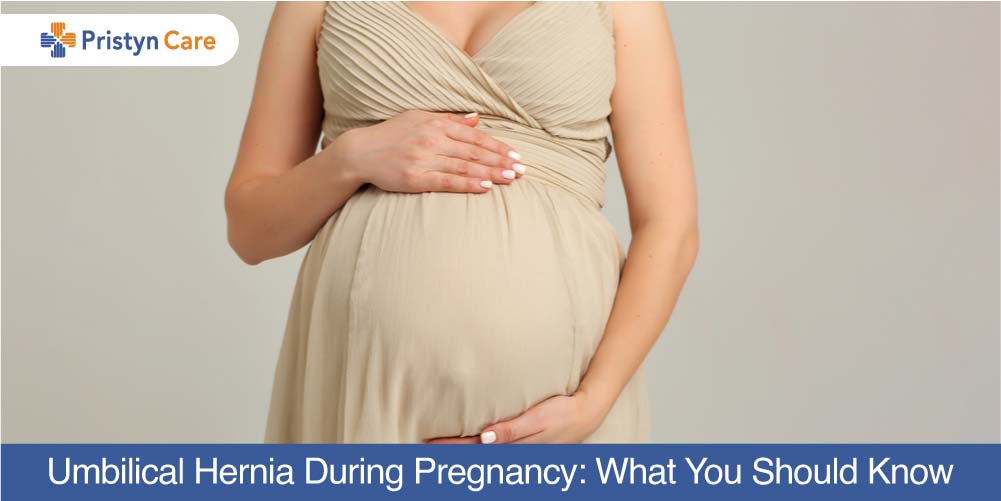
It is a common sight of the belly button popping out in women during pregnancy. But sometimes this popping out of the navel during pregnancy or after childbirth can indicate a hernia.
It becomes a topic of concern for would-be mothers if they have developed a hernia. Here’s a quick guide that can help answer some questions pregnant women might have in relation to hernia.
Table of Contents
What is Umbilical Hernia During Pregnancy?
A hernia develops when there is a small opening through which a part of any other abdominal organ pushes through.
During pregnancy, as the uterus grows and stretches, it puts extra pressure on the abdominal wall. Moreover, it also puts pressure on the tiny holes that may be present since birth causing the openings to widen.
The hernia usually repairs on its own after the delivery. As long as one doesn’t feel any severe pain or bulging out too far with the hernia, there are no potential risks to the mother or to the growing baby.
If the hernia is small, it is still possible for mothers to have a normal, healthy vaginal delivery. For large hernias, doctors recommend C-section to deliver the baby.
What are the Causes of developing an Umbilical hernia during Pregnancy?
There are various causes would-be mothers develop a belly-button hernia. Due to excessive pressure build-up in the abdomen and pelvic area, an umbilical hernia develops. In addition to this, the abdominal muscles also become thinner and weaker during pregnancy.
The tiny womb of women in their second trimester, around 20th to 22nd week, enlarges up like a balloon. During the enlargement, the womb swells up and the intestines push to the upper and back parts of the stomach.
Studies suggest that most hernias are present at birth, which means these are congenital in nature.
Some of the major causes of umbilical hernia are discussed below-
- Multiple pregnancies
- Being overweight
- Long hours of labor
- Weakening of core muscles
- Excessive straining
- Collection of fluids in the abdominal cavity
What Symptoms Should I Look For Hernia During Pregnancy?
Look for the following symptoms and visit your gynecologist if you experience any of the following symptoms-
- Extreme pain near the hernia that remains persistent
- The bulge is firm and extremely painful when touched
- Repeated episodes of vomiting
- Feeling of nausea
Can a hernia during pregnancy or delivery hurt the baby?
There is nothing to be concerned about pregnant women who have developed a hernia. The hernia doesn’t hurt the baby as it is curled up in the amniotic sac. The hernia is unable to reach the baby hence, it doesn’t affect the baby at all. The baby is absolutely safe inside the uterus.
However, if you don’t feel like eating then contact your doctor as it is important that proper nutrition is provided to the baby.
Also Read: Food guide for pregnant women
How is a hernia during pregnancy treated?
A hernia that develops during pregnancy is usually treated after the childbirth. The doctor keeps a watchful eye on the hernia until the baby is born. Usually, after pregnancy, the doctor repairs a hernia with surgery. However, repairing a hernia without surgery is also possible.
Depending on the mother’s physical condition, the doctor recommends treatment for curing the hernia.
Non-surgical treatment for curing a hernia during Pregnancy
Doctors prescribe regular exercise like yoga, aerobic and stretching rather than going for surgery. This is because, after the birth, the body is still recovering.
One can try breathing exercises, yoga, stretching, cycling, and meditation to strengthen the abdominal muscles. But make sure that you avoid exercises that put extra pressure on the abdomen and pelvic muscles.
Another thing to consider is maintaining the correct posture. Learn some stress-relieving techniques also.
Refrain from wearing high heels as it puts pressure on the lower abdominal muscles and increases the chances of umbilical hernia.
Some exercises that can help reduce the hernia and get relief are-
- Cycling the legs
- Boat pose
Also Read: 10 Ways To Treat Hernia Without A Surgery
For people suffering from constipation, it is important that they don’t strain excessively as this can put pressure on the hernia and make the condition worse. Therefore, eat lots of fiber-rich foods and drink lots of water.
Surgical Treatment For Hernia During Pregnancy
If the hernia is large enough or it has become strangulated, then surgery is the only way to repair it. The surgical treatment for hernia involves putting the protruded tissue back to its place and then closing the opening.
This can be in two ways- open or laparoscopic hernia repair. In the open method, a large incision is made and then the organ is put back. While with the laparoscopic repair, the organ is put back through small incisions with the help of a laparoscope. The recovery is quicker with the latter one.
Does Hernia Repair Surgery Affect Fertility?
There is no evidence that can indicate that hernia repair causes infertility or problems in conceiving in the future. But the chances of developing an umbilical hernia increases if it has developed during the first pregnancy.
Appropriate treatment clubbed with a healthy lifestyle can help in a faster recovery after hernia surgery. Thus you can experience the joy of motherhood without any problems.
For women who are looking for hernia treatment after childbirth, Pristyn Care provides the most-effective hernia repair. Give us a call or drop your query in the comment section below!







